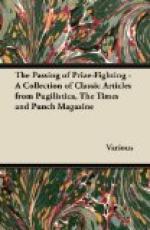[Illustration: Mr. G.H. Roberts. “I COME TO BURY FOOD CONTROL—ALSO TO PRAISE IT.”]
The issue of an official pamphlet on “The Classics in British Education” aroused the wrath of Colonel YATE, who contemptuously asked what “suchlike subjects” had to do with reconstruction. Before the Minister could answer, Sir JOHN REES, fearing lest all Anglo-Indians should be thought to hold the same cultural standard, jumped to his feet to declare that he had read the pamphlet and found it admirable.
Of all the new Departments instituted during the War the Food Ministry has best justified its existence. Mr. GEORGE ROBERTS’S account of its activities was very well received, and many regrets were expressed that he should have come to bury CAESAR as well as to praise him. Mr. CLYNES, to whom and the late Lord RHONDDA much of the Ministry’s success was due, was particularly insistent on the need of some permanent Government control, to counter the machinations of the food-trusts.
The chief criticisms of the Ministry related to its milk-policy, and these were appropriately dealt with by Mr. MCCURDY.
Wednesday, May 7th.—In Downing Street apparently Mesopotamia is not regarded as a “blessed word,” for when Colonel WEDGWOOD asked whether that country, after its future status had been decided, would be taken out of the hands of the Foreign Office Mr. CECIL HARMSWORTH fervently replied, “I hope so!”
I wonder whether Sir DAVID BEATTY, now enjoying a well-earned holiday on the Riviera, is as grateful as he ought to be to Commander BELLAIRS for trying to get him back into harness. He has been promised both by Mr. BALFOUR and Mr. LONG the reversion of Sir ROSSLYN WEMYSS’ post as First Sea Lord as soon as it is vacant. But no immediate change is contemplated. Meantime it is pleasant to learn from Mr. LONG that the late C.-in-C. of the Grand Fleet “has been consulted on Naval policy since the Armistice.” So he is not yet quite forgotten.
A new form of wireless telegraphy has been invented by the Post Office officials. When really urgent messages are handed in for transmission to Paris they despatch them by passenger train; they find this method much quicker than cabling.
An attempt by Sir DONALD MACLEAN to draw attention to the recent exploits of the LORD LIEUTENANT OF IRELAND in the field of Journalism was severely suppressed by the SPEAKER, who perhaps thinks that the less said about them the better. It seems a pity that the Press Censor should have been demobilised just when his famous blue pencil might have been really useful.
Recognising that in the present temper of the House a frontal attack upon Imperial Preference was a forlorn hope the Free Traders sought to destroy it by an enfilading fire. But their ingenious attempt, in the alleged interest of the consumer, to extend to China tea the same reduction as to the product of India and Ceylon was easily defeated. Mr. CHAMBERLAIN means to have no Chinks in his armour.




